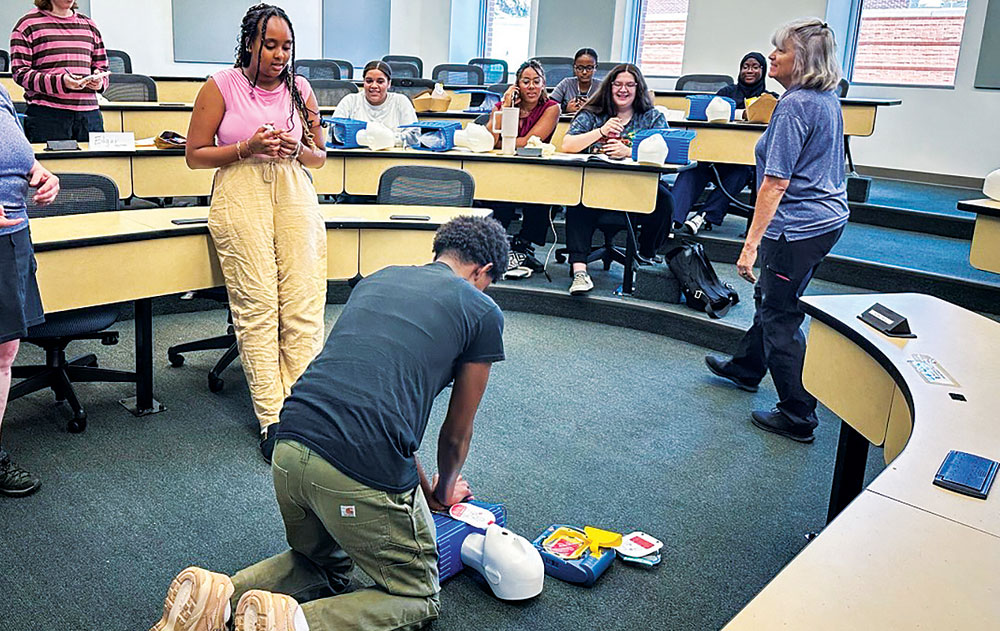
High schoolers learn about life-saving techniques such as CPR as part of their exploration of careers in math, science, healthcare, and technology through the CU Pre-health Scholars college prep program.
Students who spent part of their summer vacation on the University of Colorado Anschutz Medical Campus might just be the healthcare providers of the future. They were taking part in one of Colorado’s most comprehensive preparatory programs for high-achieving, nontraditional middle and high school students.
Unlike the average college prep program, CU Pre-health Scholars (CUPS) is an integrated academic initiative that intentionally supports underrepresented students. And since the program is based on a medical campus, CUPS focuses on math, science, technology, and specifically, healthcare.

Students in the CU Pre-health Scholars program on the CU Anschutz Medical Campus participate in a hands-on STEM project this summer.
“It’s important for us to expose students to ideas and resources that they would otherwise not get connected to,” says CUPS director Dr. Jessica Luna Garcia. This summer the program ran a multi-week program for juniors and seniors, in addition to classes and field trips for students in sixth through tenth grade.
Most CUPS scholars enter the program with dreams of becoming a medical doctor “because that’s what they know,” Luna Garcia says. CUPS introduces students to a wide range of math and science professions through career panels, lab research, and classes on how to research, physical therapy, dentistry, coding, nursing, and neuroscience, among others. “We help students define what success looks like for them,” she explains.
Rising CUPS senior Handakina Tsegaye says CUPS “is an amazing opportunity for me and my family and has lifted a burden off my parents,” who are immigrants. Without CUPS, she continues, “I wouldn’t have the chance to consult professionals. I’ve gotten to learn about STEM from people directly in the field.” She plans to become a cardiothoracic surgeon and is in the process of applying to college.
Brianna Obot, a rising senior, says CUPS “opens your eyes to what you want to do.” Her favorite CUPS class was on health equity. During a CUPS medical simulation, she applied what she learned about equity to infuse empathy into a tense (simulated) emergency room. “We sang to the patient to calm her down,” Obot recalls. “We are not just learning about the work but about the emotional aspect.” She hopes to channel her CUPS education into a career as a neuropsychologist.
Providing access and resources looks practical at CUPS, starting with the program’s price tag. “There is no financial cost; the cost is their time and their commitment,” notes Luna Garcia.
The program “gives students confidence from an early age to collect the tools for their toolbox” for success, says Sothary Chea, who manages the middle school CUPS program. Students are guided through the application processes for college, financial aid, and scholarships. Juniors and seniors receive college credit from some of their CUPS classes through the University of Colorado Denver.
CUPS draws scholars from dozens of public middle and high schools in Denver and Aurora. Priority is given to students who have a disability, are neurodivergent, receive free or reduced lunch, are first-generation students, or who attend Title 1 schools. The program currently includes about 150 students.
Luna Garcia is motivated by her own experience. “I am a first-generation, nontraditional student, and I had a lot of doors shut in my face,” she says. “It’s not enough to throw dollars at these students. I love connecting the population I serve with someone that can support them.”
Dr. Dominic Martinez, who oversees CUPS through the CU Anschutz Office of Diversity, Equity, Inclusion, and Community Engagement, says launching underrepresented students has a positive ripple effect: “Through research, we know that a diverse healthcare workforce supports positive patient experiences and equity in health outcomes.”
The high school CUPS program has been running in different forms for 20 years. It was revamped by Luna Garcia in 2023. The middle school program began last year.
Photos courtesy of CU Pre-Health Scholars


0 Comments